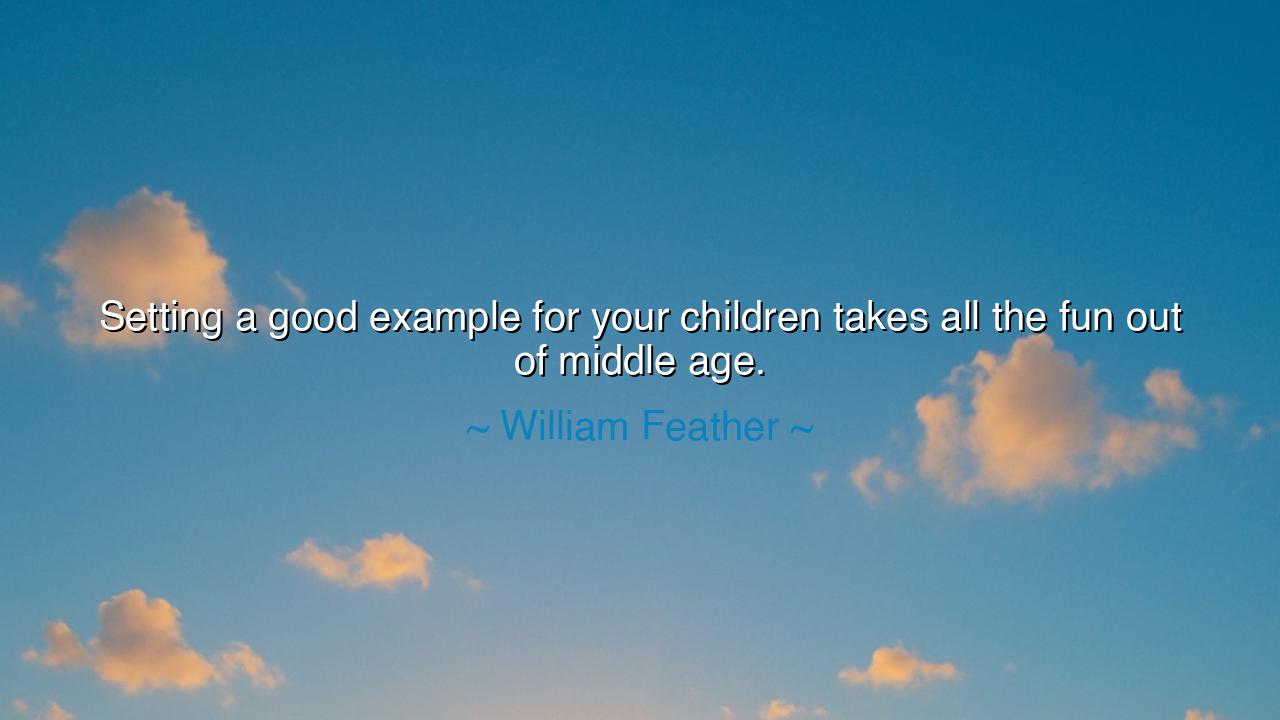
Setting a good example for your children takes all the fun out of






"Setting a good example for your children takes all the fun out of middle age." — so spoke William Feather, the sharp-witted essayist and philosopher of everyday life, whose humor cloaked deep understanding of the human heart. His words, though playful on their surface, conceal a truth known to all who have walked the long road of responsibility: that to lead, one must sacrifice; that to teach, one must restrain; and that to parent, one must often forgo the small pleasures of folly in service of a greater legacy. Beneath the laughter of this quote lies the quiet nobility of duty — the eternal balance between desire and discipline, between the joy of indulgence and the wisdom of example.
In the style of the ancients, one might say: the lamp that lights another must burn itself with steadiness. Feather’s words remind us that with the passing of youth, life calls upon us to become guides rather than wanderers. In middle age — that season between ambition and decline — a man or woman stands at the summit, seeing both where they have come from and where their children must yet go. It is then that the playful impulses of youth must bow to the dignity of responsibility. To set a good example, one must tame their own appetites, not because the fire of life has gone out, but because their light must now serve others. The jest, then, is bittersweet: for in gaining the power to shape the future, one loses the freedom to be reckless in the present.
Yet Feather’s humor carries no bitterness — only understanding. He knew that the “fun” of middle age does not vanish, but transforms. In youth, joy comes from the chase — from daring, from laughter, from breaking the rules. But in maturity, joy takes on another form: the satisfaction of seeing one’s wisdom echoed in the next generation. It is the quiet pride of a parent who watches a child make the right choice, or who learns that restraint, too, is a kind of pleasure. To live rightly for the sake of another — to be a living model of virtue — is the most demanding form of love.
Consider the story of Marcus Aurelius, emperor of Rome and philosopher-king. Surrounded by temptation and luxury, he lived with simplicity, knowing that the empire looked to him as a mirror of morality. In his private writings, The Meditations, he often lamented the weight of example — the need to remain calm when provoked, just when the soul longed to shout; the need to remain humble amid glory. Like Feather, he might have smiled at the irony: that to live nobly can at times feel like losing freedom. Yet Marcus understood, as all great souls do, that the burden of example is the price of greatness — and that those who bear it illuminate the path for others.
William Feather, a businessman and father, lived in an age of rising industry and shifting values. His wit often captured the tension between duty and desire in the modern world. When he wrote that “setting a good example takes all the fun out of middle age,” he was not scorning virtue, but acknowledging the cost of it. To live responsibly is to deny oneself certain indulgences — to choose temperance over excess, honesty over ease, restraint over pleasure. Yet even as he joked, Feather was pointing toward a deeper truth: that the true joy of adulthood is not in indulgence, but in influence — in the silent inheritance of values passed from parent to child.
The lesson, therefore, is not to mourn what is lost, but to celebrate what is gained. To the mother who sacrifices rest to nurture, to the father who tempers anger to teach, to the mentor who leads with patience — know that your restraint is not weakness, but legacy. The laughter of youth fades, but the respect of your children endures. When you choose integrity over ease, you carve a monument invisible yet everlasting — written not in stone, but in the character of those who come after you.
And so, my child, remember the wisdom hidden in Feather’s jest: that even humor carries truth. Life asks each generation to give up a measure of pleasure so that those who follow may live better. When you reach your own middle age, and the world tempts you to grow weary of example, smile as Feather did. Know that the fun you have lost is not gone — it has been transformed into something greater. For the highest joy is not in living for oneself, but in becoming the light by which others find their way.






AAdministratorAdministrator
Welcome, honored guests. Please leave a comment, we will respond soon